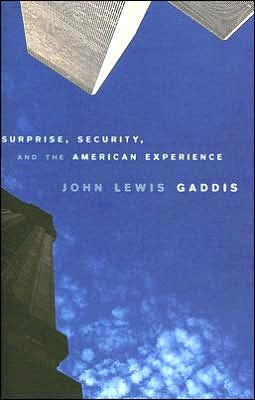Surprise, Security, and the American Experience
September 11, 2001, distinguished Cold War historian John Lewis Gaddis argues, was not the first time a surprise attack shattered American assumptions about national security and reshaped American grand strategy. We've been there before, and have responded each time by dramatically expanding our security responsibilities.\ The pattern began in 1814, when the British attacked Washington, burning the White House and the Capitol. This early violation of homeland security gave rise to a strategy...
Search in google:
September 11, 2001, distinguished Cold War historian John Lewis Gaddis argues, was not the first time a surprise attack shattered American assumptions about national security and reshaped American grand strategy. We've been there before, and have responded each time by dramatically expanding our security responsibilities.The pattern began in 1814, when the British attacked Washington, burning the White House and the Capitol. This early violation of homeland security gave rise to a strategy of unilateralism and preemption, best articulated by John Quincy Adams, aimed at maintaining strength beyond challenge throughout the North American continent. It remained in place for over a century. Only when the Japanese attacked Pearl Harbor in 1941 did the inadequacies of this strategy become evident: as a consequence, the administration of Franklin D. Roosevelt devised a new grand strategy of cooperation with allies on an intercontinental scale to defeat authoritarianism. That strategy defined the American approach throughout World War II and the Cold War.The terrorist attacks of 9/11, Gaddis writes, made it clear that this strategy was now insufficient to ensure American security. The Bush administration has, therefore, devised a new grand strategy whose foundations lie in the nineteenth-century tradition of unilateralism, preemption, and hegemony, projected this time on a global scale. How successful it will be in the face of twenty-first-century challenges is the question that confronts us. This provocative book, informed by the experiences of the past but focused on the present and the future, is one of the first attempts by a major scholar of grand strategy and international relations to provide an answer. The New York Times When he looks to the future, Gaddis raises more questions than he answers, but he raises the right ones. One of these is whether the administration's domestic policy is consistent with its grand strategy. Gaddis notes the contrast between Roosevelt's call for national sacrifice to win World War II and Bush's decision to place the burden of today's wars only on those who do the fighting -- and on future generations that must pay the bills. One has to wonder whether the administration's fiscal and energy policies are consistent with the goal of maintaining American global predominance. — Jack F. Matlock Jr.
1. A Morning at Yale2. The Nineteenth Century3. The Twentieth Century4. The Twenty-First Century5. An Evening at YaleNotesIndex
\ BooklistGaddis argues that George W. Bush in the invasions of Afghanistan and Iraq attempted FDR's exploitation of multilateralism but ultimately elected preemption ('shock and awe') in the service of global hegemony. Even Bush's staunchest opponents stand to be edified by Gaddis' impressive presentation.\ — Ray Olson\ \ \ \ \ \ Chronicle of Higher EducationOriginal, stimulating...concise and lucid...Gaddis['] book is in a class by itself and, despite its brevity—a mere 118 pages of text—is likely to be of lasting value.\ — Robert J. Lieber\ \ \ \ Cleveland Plain DealerGaddis, a Yale professor, is one of our most distinguished students of American democracy. He concludes that the Bush administration's approach to Iraq draws on past traditions but also deviates from them in troubling ways. The result might be a grand strategic blunder that weakens American security.\ — John Maxwell Hamilton\ \ \ \ \ \ CommentarySurprise, Security, and the American Experience [is] a sober attempt to analyze Bush's foreign policy in historical context and without partisan rancor...Gaddis is a graceful writer, and he has sprinkled provocative insights throughout...Gaddis's major contribution is to treat the Bush Doctrine as a set of ideas worthy of scholarly examination rather than as a subject for ritualistic denunciation.\ — Max Boot\ \ \ \ \ \ Foreign AffairsThis book is a persuasive account of the Bush administration's grand strategy and demonstrates the power of strategic analysis drawn from the American national experience...Gaddis' focus on U.S. foreign policy and history gives him powerful tools that he exploits to the fullest, elucidating the similarities between the strategies of John Quincy Adams and Franklin Roosevelt, which have shaped the evolution of U.S. power, and contrasting both with the emerging grand strategy of the Bush administration...A strategy, Gaddis notes, may be grand without being successful, and he asks some tough questions about the validity of the assumptions on which the Bush strategy rests...Surprise, Security, and the American Experience is a substantive accomplishment and a valuable contribution to the most important debates of our time.\ — Walter Russell Mead\ \ \ \ \ \ New RepublicAs John Lewis Gaddis points out in his splendid essay on the relationship between surprise attacks, American national character, and foreign policy, the principles of Bush's foreign policy—unilateralism and the rest—are not at all aberrant for America. They have a foundation in our history. They are also not working, Gaddis claims, in an argument that is all the more devastating for being scrupulously fair to, and perceptive about, the current administration...Gaddis is convincing in arguing that the Bush administration has paid a heavy price for sustaining momentum in the war on terrorism rather than consolidating its battlefield successes through a more focused, more Rooseveltian multilateralism.\ — Jim Hoagland\ \ \ \ \ \ New York SunThe clarity of Mr. Gaddis's writing matches the clarity of his arguments. Each chapter of Surprise, Security and the American Experience is itself a well-rounded essay, perhaps reflecting the fact that they were public lectures, and their simplicity underscores their depth. Though this is a small book, it is a book of big ideas; in these times, those are of surpassing values.\ — Thomas Donnelly\ \ \ \ \ \ New York Times Book ReviewGaddis...points out that three salient elements of the Bush security strategy—pre-emption, unilateralism and hegemony—have deep roots in the country's history. When threatened, Americans have typically taken the offensive rather than hide behind a static defense...Throughout his essays, Gaddis employs a judicious tone and avoids categorical or simplistic answers. He recognizes that the United States faces a different sort of threat from those of the cold war and earlier. Traditional deterrence and balance-of-power policies are inadequate to confront the devil's brew of failed states, rogue regimes, suicidal terrorists and proliferating weapons of mass destruction.\ — Jack F. Matlock Jr.\ \ \ \ \ \ The EconomistFor a master-class in how to use history to clarify your thinking the man to turn to is John Lewis Gaddis, a distinguished cold-war historian at Yale. In Surprise, Security, and the American Experience he manages to cast brilliant light on how September 11th and its aftermath should be seen in the context of the country's history, and on how the Bush administration's very grand strategy should be understood, but also criticised.\ \ \ \ \ \ The Weekly StandardSurprise, Security, and the American Experience has the virtue of being genuinely original, rather than merely clever, and is at once dispassionate and public spirited. Anyone wanting to understand the deepest intellectual and historical sources behind Bush's foreign policy, as opposed to all the blather about 'neocon cabals,' should pick up Gaddis's book.\ — Adam Wolfson\ \ \ \ \ \ Times Literary SupplementIn his very short book, Surprise, Security, and the American Experience, John Lewis Gaddis takes a very long perspective on the part which the pursuit of hegemony has played in America's quest for security, first as an observer, then as a newcomer to the Great Power game.\ — James M. Murphy\ \ \ \ \ \ Wall Street JournalIn Surprise, Security, and the American Experience, [Gaddis] offers a judicious mix of analysis and history to argue that, although the Bush administration's response to the terrorist attacks was indeed bold, it was hardly unprecedented.\ — Christian D. Brose\ \ \ \ \ \ Washington PostJohn Lewis Gaddis's excellent Surprise, Security, and the American Experience is a short book with a long view. Gaddis compares foreign policy reactions to three attacks on America—the British burning of Washington in 1814, the attack on Pearl Harbor in 1941 and the terrorist attack of Sept. 11, 2001. This is no humdrum recounting of familiar events. In addition to giving a brilliant short course in American diplomatic history, Gaddis offers a big surprise: George W. Bush's foreign policy post-Sept. 11, which Gaddis calls pre-emptive, unilateral and hegemonic, is as American as apple pie.\ — John Lehman\ \ \ \ \ \ Washington TimesSurprise, Security, and the American Experience seems destined to become the academic touchstone for hawks seeking to buttress political argument with scholarly authority. Luckily for them, this book is engaging, lucidly written and possesses a historical footing as firm as any short, politically provocative work of the last several years.\ — Brendan Conway\ \ \ \ \ \ The New York TimesWhen he looks to the future, Gaddis raises more questions than he answers, but he raises the right ones. One of these is whether the administration's domestic policy is consistent with its grand strategy. Gaddis notes the contrast between Roosevelt's call for national sacrifice to win World War II and Bush's decision to place the burden of today's wars only on those who do the fighting -- and on future generations that must pay the bills. One has to wonder whether the administration's fiscal and energy policies are consistent with the goal of maintaining American global predominance. — Jack F. Matlock Jr.\ \ \ \ \ Publishers WeeklyThe post-September 11 strategy of the Bush administration is often described as a radical departure from U.S. policy. Gaddis, one of America's leading scholars of foreign policy and international relations, provocatively demonstrates that, to the contrary, the principles of preemption, unilateralism and hegemony go back to the earliest days of the republic. Gaddis resurrects the 18th-century idea of an "empire of liberty": whether as a universal principle or in an American context, liberty could flourish only in an empire that provided safety. The British burning of Washington in 1814 highlighted American vulnerability to certain forms of surprise attack. In consequence, Gaddis recounts, John Quincy Adams developed a strategy of seeking control over the North American continent with minimal coercion, but through preemptive action where necessary. The attack on Pearl Harbor extended the concept to global dimensions, eventually expanding the U.S. sphere of influence exponentially. The events of September 11 extended the concept of preemptive action even at the expense of sovereignty when terrorism is involved. Gaddis describes this latest expansion of American power in response to surprise attack as a volatile mixture of prudence and arrogance. But instead of the usual caveats, he recommends the U.S. continue on an interventionist course, and he has no qualms about calling America the best hope of liberty in the eyes of most of the earth's inhabitants. The ability to question all values that is liberty's essence depends, he finds, on defending certain values-unilaterally and preemptively when necessary, but not randomly. This compact, provocative history of an idea-in-action has the potential to alter the U.S.'s collective self-image. (Mar.) Copyright 2004 Reed Business Information.\ \ \ \ \ Foreign AffairsThis book is a persuasive account of the Bush administration's grand strategy and demonstrates the power of strategic analysis drawn from the American national experience. Most accounts of grand strategy draw on the abstractions of political science or the history of the post-Westphalian state system in Europe. Gaddis' focus on U.S. foreign policy and history gives him powerful tools that he exploits to the fullest, elucidating the similarities between the strategies of John Quincy Adams and Franklin Roosevelt, which have shaped the evolution of U.S. power, and contrasting both with the emerging grand strategy of the Bush administration. Vulnerability is the key to all three strategies, Gaddis argues. The 1814 burning of Washington, D.C., by British forces, the Japanese attack on Pearl Harbor, and al Qaeda's attacks on September 11 jolted Americans to reexamine their place in the world and, in each case, to expand their security frontiers and embrace a more ambitious foreign policy to deal with new threats. A strategy, Gaddis notes, may be grand without being successful, and he asks some tough questions about the validity of the assumptions on which the Bush strategy rests. How the United States can win international support (or at least consent) for a vigorous foreign policy in response to new and nontraditional threats is the question that troubles him most. He hints that a return to the principles of "federalism" may provide the answer. Perhaps. In any case, Surprise, Security, and the American Experience is a substantive accomplishment and a valuable contribution to the most important debates of our time.\ \








